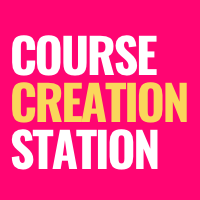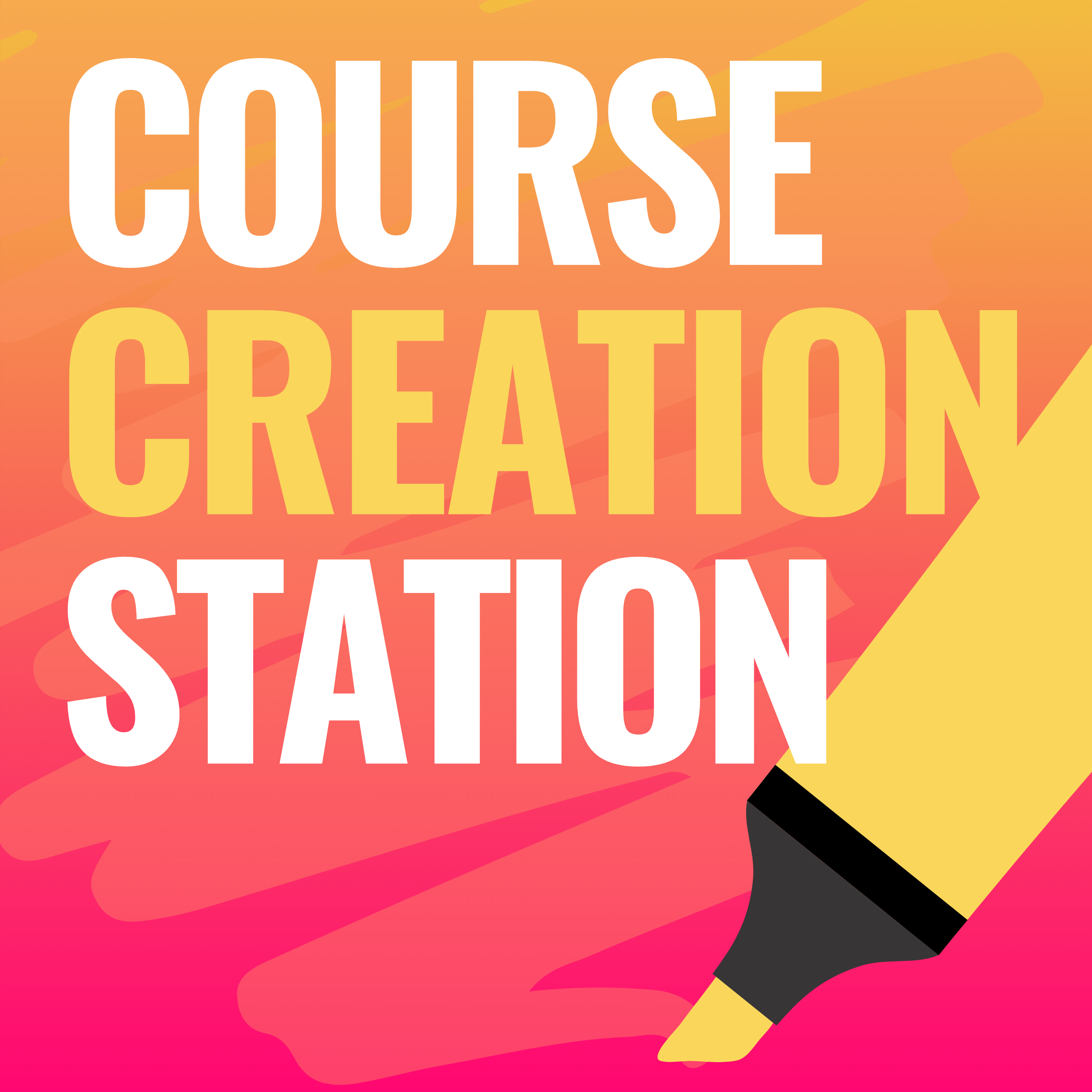Episode 2
How to Choose the Best LMS for Your Course
Hey, Course Creator!
You've reached the show notes for this episode. But before you get started, did you grab your FREE course creation starter guide yet? Be sure to grab it at the link below and learn my 7-step course creation process:
>> Create Your AWESOME Course Starter Guide <<
About this episode:
Your Learning Management System (LMS) is the stage where your course comes to life! It's so important to get it right and usually our first step to finding the perfect LMS is to ask Google (or just use what someone else uses). But that's not the best way to pick the right LMS for your course. In this episode, we discuss how to choose the best LMS for your needs.
Goals:
After listening to this episode, you will know:
- Why choosing the right LMS or course platform so important.
- The difference between "corporate" and "indie" systems (and which is right for you).
- The key factors that will help you to determine if an LMS will work for the experience you want to create for your students.
Stay in touch:
- Let's work together! Visit me at https://gwentanner.com and get in Contact so that we can work together on your amazing project.
- Get the FREE Create Your AWESOME Course Starter Guide! Learn my 7-step course creation process for planning and creating your awesome course.
Transcript:
Please note: This transcript may be automatically generated and may contain errors. I appreciate your understanding.
Transcript
Hey course creators, it's time to amplify your genius. Welcome to Course Creation Station where we talk about creatively sharing your expertise and designing the most awesome learning experiences. I'm Gwen Tanner, career course creator, and in this episode, we're talking about the stage where your course comes to life, your learning management system. Get it right and the show is a hit. Get it wrong and while it might feel like performing in the dark. Stay tuned for more.
So why is choosing the right learning management system or LMS or course platform so important? Think of it as the stage for your virtual classroom. Now imagine you've written a screenplay and you're putting it on at your local theater and it's your opening night. A show with actors, costumes, lighting, props, and sound. If your show isn't managed properly, actors don't know their lines and some are wearing the wrong costume. Someone trips on a prop and pulls down the curtain. The light is shining on the audience instead of the actors. No one can hear anything because the sound system isn't working. And while you might have a fascinating story to tell, the audience is distracted by the chaos of it all.
To prevent this, you need a stage manager who will make sure rehearsals go smoothly and oversee the lighting and the props and the sound and make sure all the actors are wearing the correct costumes and know their lines. All with the goal of making sure your fascinating story is presented in its best light. That's what your LMS does.
An effective LMS not only delivers your content, but also shapes the learning experience for your students. Think about the task that a teacher in a classroom does. She might take attendance or distribute learning materials and assignments, make announcements, grade quizzes, track students' overall progress, share feedback. An LMS facilitates all of those tasks and much, much more.
Now, how do you go about choosing the perfect LMS for your needs? There are a few key factors to take into consideration. First, consider your course content. Does it involve a lot of multimedia discussions or assessments or maybe you need Zoom to be integrated? Do you need something unique that has to do with what you're teaching like simulations or virtual reality? Do you need your students to be able to submit video assignments or work on projects together? Different LMS platforms have strengths in different areas, so aligning their features with your course goals is going to be key to selecting the perfect LMS for your needs.
Ease of use is another important factor. Think about your audience, and that's your students or maybe co-teachers or partners that you're working with on your course. Are they tech savvy or do they need a more user-friendly interface? Your LMS should be intuitive for both you and your students. Not everyone in your virtual classroom will be a tech wizard, so a user-friendly interface can make a world of difference to the learning experience.
Also, don't underestimate the power of really, really, really good customer service. Check if the LMS provider offers responsive customer support, especially in your time of need, like when you're hitting the launch button on your course. You want to make sure your service provider is there to help you overcome any technical hiccups that might occur as you're building out your course or writing your course, or if your students have issues with logging in or accessing materials.
All right, so the elephant in the room, the cost of an LMS. Now, while there are many free or low-cost options out there, it's crucial to balance your budget with your needs. Some platforms may offer tempting pricing or even free options, but hidden fees or limitations in the lower price levels can emerge down the line. As an example, some of the free LMS price options are good to start with just to try out the system, but you may be limited to only one course or a limited number of students or a reduced set of features. So understanding the pricing structure and making sure it all aligns with your course growth is very, very important.
Now, I also want to touch on the two audiences for LMS providers. LMS providers come on two different sides of the same coin. On one side, we have the corporate systems, which include Cornerstone and SAP SuccessFactors, Oracle Learning, and Blackboard, to name a few. Now, these guys are catered more towards corporate environments. So think of them as the CEOs of the course platforms. They're comprehensive and sophisticated to meet the demands of large-scale organizations. They offer complete customization, scalability, advanced reporting, and compliance tracking, and they're often connected to HR systems, and they help with performance management of employees. So they're suitable for larger companies with up to tens of thousands of employees.
Now, on the other side of the coin, we have what I'm considering the more consumer-focused systems, such as Thinkific and Teachable, Learn Worlds, and LearnDash. Now, think of these guys as the indie course platforms, the little independent providers. They cater to individual entrepreneurs, coaches, small businesses, and educators for creating and selling online courses. These systems focus on user-friendly interfaces, making it easy for course creators without extensive technical knowledge. You don't need a whole implementation team to get set up. Basically, you just sign up with your email address and upload your course, and you're all set.
Another perk of these LMS platforms is that they understand course creators want to sell courses so they come with a number of marketing and sales tools, all in one platform. Now, I wanted to touch on this because Google happens, and I've seen new course creators trying to select an LMS but not really understanding what they're looking at. There was this one young course creator I knew who was so excited when she learned about Adobe's corporate LMS and her Google research, and she was familiar with Adobe as a company, so she figured why not use their LMS? But it was not the LMS she needed. She was a one-woman show. She was creating a new video-based art course to sell online to her followers, and in her case, something like Teachable or Thinkific would have been more appropriate.
Remember, choosing your LMS is a big decision, but it doesn't have to be a daunting decision. Consider your content and your audience, prioritize user-friendliness, and keep a close eye on the cost. Your LMS is the backbone of your online course. It is the perfect stage to run your show, so take the time to find the one that best supports your teaching vision. I hope you're feeling more confident now about choosing the right LMS for you.
If you have any questions or if there's a specific topic concerning learning management systems you'd like me to cover in future episodes, feel free to reach out.
Thank you for joining me today for this episode of Course Creation Station. Be sure to visit CourseCreationStation.com to view today's show notes and subscribe.


